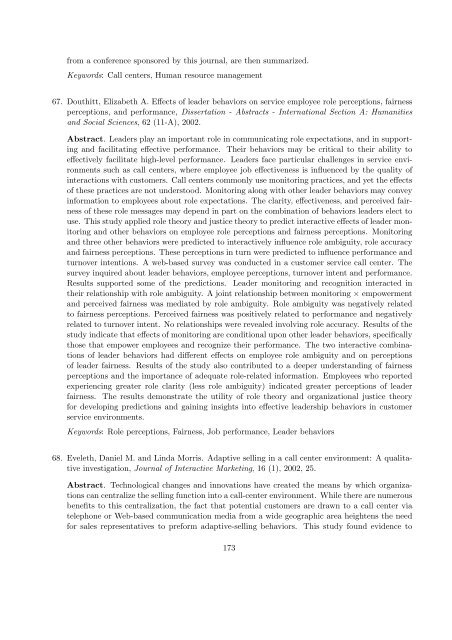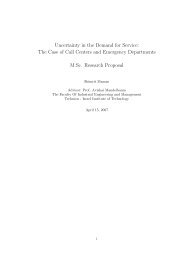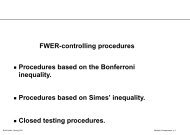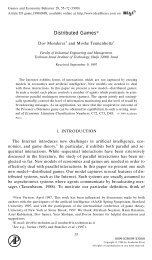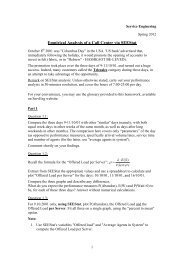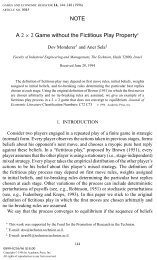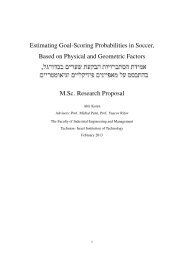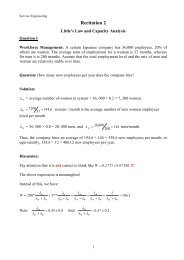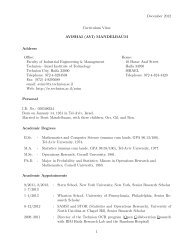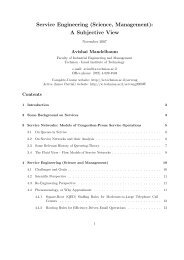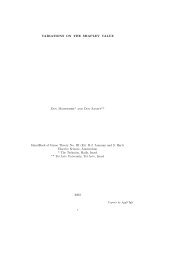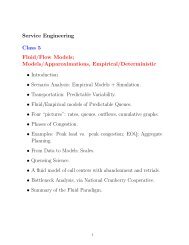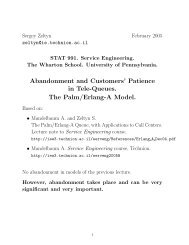CALL CENTERS (CENTRES) - Faculty of Industrial Engineering and ...
CALL CENTERS (CENTRES) - Faculty of Industrial Engineering and ...
CALL CENTERS (CENTRES) - Faculty of Industrial Engineering and ...
Create successful ePaper yourself
Turn your PDF publications into a flip-book with our unique Google optimized e-Paper software.
from a conference sponsored by this journal, are then summarized.<br />
Keywords: Call centers, Human resource management<br />
67. Douthitt, Elizabeth A. Effects <strong>of</strong> leader behaviors on service employee role perceptions, fairness<br />
perceptions, <strong>and</strong> performance, Dissertation - Abstracts - International Section A: Humanities<br />
<strong>and</strong> Social Sciences, 62 (11-A), 2002.<br />
Abstract. Leaders play an important role in communicating role expectations, <strong>and</strong> in supporting<br />
<strong>and</strong> facilitating effective performance. Their behaviors may be critical to their ability to<br />
effectively facilitate high-level performance. Leaders face particular challenges in service environments<br />
such as call centers, where employee job effectiveness is influenced by the quality <strong>of</strong><br />
interactions with customers. Call centers commonly use monitoring practices, <strong>and</strong> yet the effects<br />
<strong>of</strong> these practices are not understood. Monitoring along with other leader behaviors may convey<br />
information to employees about role expectations. The clarity, effectiveness, <strong>and</strong> perceived fairness<br />
<strong>of</strong> these role messages may depend in part on the combination <strong>of</strong> behaviors leaders elect to<br />
use. This study applied role theory <strong>and</strong> justice theory to predict interactive effects <strong>of</strong> leader monitoring<br />
<strong>and</strong> other behaviors on employee role perceptions <strong>and</strong> fairness perceptions. Monitoring<br />
<strong>and</strong> three other behaviors were predicted to interactively influence role ambiguity, role accuracy<br />
<strong>and</strong> fairness perceptions. These perceptions in turn were predicted to influence performance <strong>and</strong><br />
turnover intentions. A web-based survey was conducted in a customer service call center. The<br />
survey inquired about leader behaviors, employee perceptions, turnover intent <strong>and</strong> performance.<br />
Results supported some <strong>of</strong> the predictions. Leader monitoring <strong>and</strong> recognition interacted in<br />
their relationship with role ambiguity. A joint relationship between monitoring × empowerment<br />
<strong>and</strong> perceived fairness was mediated by role ambiguity. Role ambiguity was negatively related<br />
to fairness perceptions. Perceived fairness was positively related to performance <strong>and</strong> negatively<br />
related to turnover intent. No relationships were revealed involving role accuracy. Results <strong>of</strong> the<br />
study indicate that effects <strong>of</strong> monitoring are conditional upon other leader behaviors, specifically<br />
those that empower employees <strong>and</strong> recognize their performance. The two interactive combinations<br />
<strong>of</strong> leader behaviors had different effects on employee role ambiguity <strong>and</strong> on perceptions<br />
<strong>of</strong> leader fairness. Results <strong>of</strong> the study also contributed to a deeper underst<strong>and</strong>ing <strong>of</strong> fairness<br />
perceptions <strong>and</strong> the importance <strong>of</strong> adequate role-related information. Employees who reported<br />
experiencing greater role clarity (less role ambiguity) indicated greater perceptions <strong>of</strong> leader<br />
fairness. The results demonstrate the utility <strong>of</strong> role theory <strong>and</strong> organizational justice theory<br />
for developing predictions <strong>and</strong> gaining insights into effective leadership behaviors in customer<br />
service environments.<br />
Keywords: Role perceptions, Fairness, Job performance, Leader behaviors<br />
68. Eveleth, Daniel M. <strong>and</strong> Linda Morris. Adaptive selling in a call center environment: A qualitative<br />
investigation, Journal <strong>of</strong> Interactive Marketing, 16 (1), 2002, 25.<br />
Abstract. Technological changes <strong>and</strong> innovations have created the means by which organizations<br />
can centralize the selling function into a call-center environment. While there are numerous<br />
benefits to this centralization, the fact that potential customers are drawn to a call center via<br />
telephone or Web-based communication media from a wide geographic area heightens the need<br />
for sales representatives to preform adaptive-selling behaviors. This study found evidence to<br />
173


